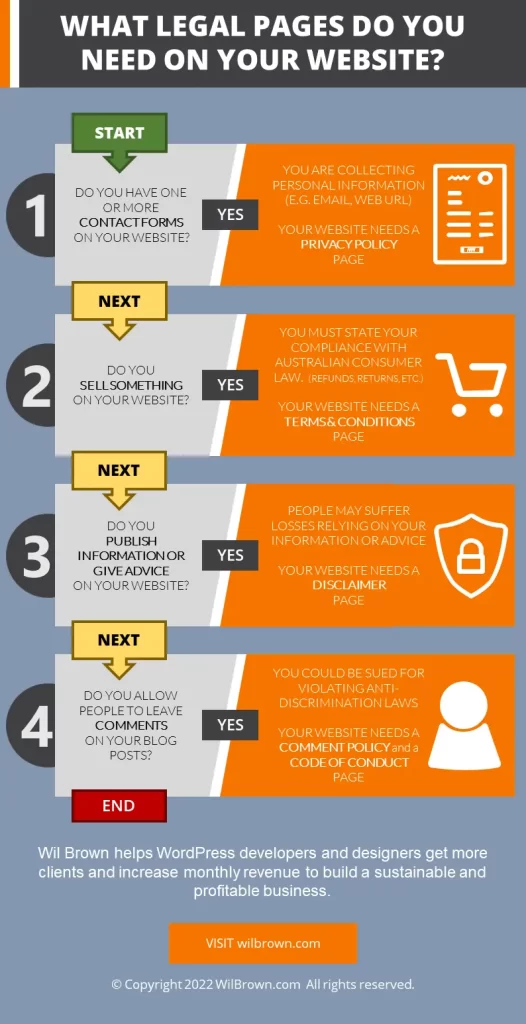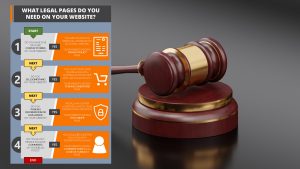After performing hundreds of website audits, one of the common omissions is the lack of legal pages.
Do you know what legal pages you need on your website?
Do you know consequences could arise from not having legal pages on your website?
I have a handy infographic you can reference for your own or your client sites.
It works by asking some simple questions about your website and outlines what pages it needs to stay legally safe.
Q1 Do you have one or more contact forms on your website?
If the answer is yes, you are most certainly collecting personal information in the form of an email address, first or last name, website URL, maybe a phone number and a country.
Your website needs a Privacy Policy page.
Consequences Of Not Having A Website Privacy Policy Page
If you collect personal information and don’t have a Privacy Policy page, you may violate numerous state, federal, and possibly even international laws regarding disclosure and maintenance requirements for this information.
Violation could result in fines and or imprisonment.
Q2 Do you sell something on your website?
If the answer is yes, you most likely must state your compliance with your country consumer law.
You need a Terms and Conditions page on your website.
Consumer law is different for each country; however, you would be required to describe your processes for handling refunds, replacements, returns, delivery, cancellations, payment terms, quality controls, etc.
If you operate in Australia, read up on how to comply with Australian Consumer Law.
Consequences Of Not Having A Website Terms and Conditions Page
Taking payment terms as an example.
If you do not clearly define what is included and what is excluded, you run the risk of over or undercharging customers and run the risk of not being able to recover costs for goods and services provided.
Taking warranty periods as another example.
Without terms and conditions, you are missing out on clearly defined warranty terms that make it clear to any clients or purchaser, just when you are on the hook for a warranty claim and, more importantly, when you are not on the hook for a warranty claim.
Q3 Do you publish information or give advice on your website?
If the answer is yes, then other people may be taking action in their business based on the advice you are giving.
You need a Disclaimer page on your website.
People and businesses could suffer losses relying on the information and advice you provide through your website, products and services.
You need to clearly define the context of the advice and information you provide on your disclaimer page.
Disclaimer: I am not a lawyer. Seek legal advice on what wording needs to go into the legal pages of your website.
See what I did there?
Consequences Of Not Having A Disclaimer Page
If you don’t clearly define what you are not liable for, you could be opening the gate to liable legal actions against you.
This is the reason that you get a safety disclaimer page with your new toaster telling you not to use it for straitening your curly hair or defrosting your frozen lamb cutlets.
If you have a disclaimer, does that mean you are off the hook from all liability?
Of course not!!
But it’s a good start in protecting yourself.
Q4 Do you allow people to leave comments on your blog posts?
If the answer is yes, you act as a medium allowing other people to express their own thoughts and opinions.
And we all know what some trolls like to leave in comments.
You need a Comment Policy page and a Code Of Conduct page on your website.
Consequences Of Not Having A Comment Policy Page
Many people think that the anonymity of the internet gives them the right to leave hateful, distasteful and discriminatory comments.
This is not correct – far, far from it.
Unfortunately, you could be sued for violating discrimination laws if you haven’t clearly outlined what type of comments are appropriate and which ones are not.
It may seem like common sense to you, but there are many people out there who seemingly leave common sense on the bedside table in the morning.
Consequences Of Not Having A Code Of Conduct Page
Similarly, if you don’t have a Code of Conduct that clearly defines what you deem acceptable when interacting with others on your website, you could be sued for acting as a medium that promotes discrimination and other illegal information.
Infographic
You can use this infographic on your own website, presentation or other media as long as you keep the attribution and copyright to me.

Summary
I am not a lawyer. I’m a business person.
You need to comply with the laws in your country and jurisdiction, which more than likely includes having at least one of the above stated on your website.

